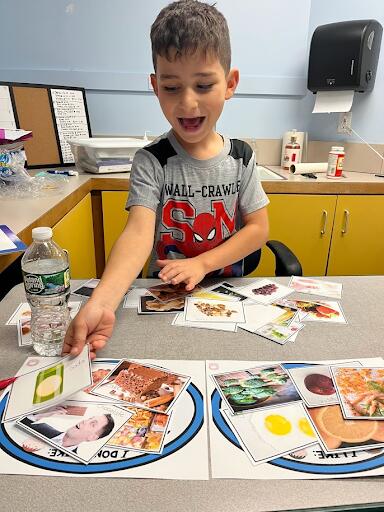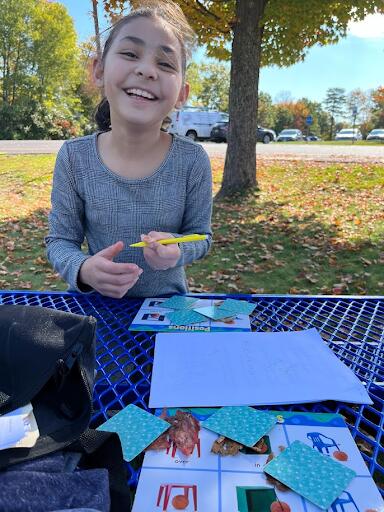English for Speakers of Other Languages

ESOL Teacher/Program Coordinator
Virginia Hennighausen
Epping Elementary & Middle High School
virginia.hennighausen@eppingsd.org
603-679-5472 Ext. 4202
Director of Student Services/LEA
Sarah Saucier - District Contact
Epping Public Schools
sarah.saucier@eppingsd.org
603-679-8003 x7105
SAU 14 LEA PLAN for ESOL Students
The Mission of the ESOL Program
The ESOL Program supports the mission of the Epping School District:
The mission of the Epping School District is to focus on the potential of every student and engage them to be passionate, confident learners who demonstrate competence and have strength of character to reach their highest aspirations and thoughtfully contribute to a diverse and changing world.
The mission of the ESOL Program is to provide support, appropriate instruction and programs that promote academic achievement in English for students whose first language is not English and are still working towards proficiency in Academic English.
What is ESOL?
English for Speakers of Other Languages, or ESOL, is a state and federally mandated program for all students whose first language is not English.
The Epping School District offers an ESOL Program, which is a combination of push-in and pull-out services by a state-certified ESOL Teacher. The district provides students identified as English Language Learners a linguistically and culturally responsive education. Specialized instruction, curriculum modifications and adaptations, and culturally-sensitive teaching techniques are all components of the Epping School District ESOL Program. The ESOL staff follow New Hampshire standards, WIDA guidelines, and best practices for second language acquisition, providing students with educational opportunities to successfully acquire social and academic English skills while concurrently developing cultural awareness. The ESOL staff also promote multicultural awareness in classrooms, equitable access for all students across the school district, and parental involvement in our schools and the community.
Who is an English Learner?
English Learners (ELs) are students who are native speakers of a language or languages other than English and who require language support to perform academic classwork in English. This student population may include recent immigrants or refugees from other countries, as well as US-born children with parents or guardians that maintain a language other than English in the home.


Student and Family Resources
Books
Multicultural Manners by Norine Dresser. Gives readers the understanding they need, the perfect words to say, and the correct behavior to use in a wide range of cross-cultural situations. Suggests methods that foster respect for diversity.
Oxford Picture Dictionary by Jayme Adelson-Goldstein and Norma Shapiro. A vocabulary development program taught by theme. Realistic scenarios, story pages and practice exercises supported by digital tools for student practice, interactive whiteboard presentation software, workbooks, classroom activities, audio and more.
Helpful Links
ABCYa - Educational games organized by grade level, from 1st to 5th; particularly good for spelling and phonics. There are games to practice vowels, uppercase and lowercase letters, Dolch sight words, synonyms and antonyms and more.
BBC - Online courses, classes, videos and quizzes for all levels of English language, help with grammar, vocabulary and pronunciation, as well as understanding the words in the news.
Colorin Colorado - a national multimedia project that offers a wealth of bilingual, research-based information, activities, and advice for educators and parents.
Exeter Adult Education - offering free Academic English Skills classes, morning and evening options, free of charge with ongoing enrollment.
Dave’s ESL Cafe - A forum for both ESOL teachers and students around the world. Includes quizzes, grammar explanations, and discussion forums for students. Includes classroom ideas on all subjects as well as discussion forums.
Starfall - Geared towards K-3, teaches basic English reading and writing skills by using games, songs, and phonics.
WIDA - This site explains language development, provides examples of what students can do based on their level of language development. It also includes information on the annual assessment given to ELs called ACCESS for ELLs 2.0.
Additionally, social media sites offer ESOL-related accounts and networking groups that can have relevant resources. There are also many free podcasts (some examples are here) available that assist in language acquisition.
Guidelines for Identifying New ESOL Students
All families must complete the Home Language Survey at the time of enrollment. The Home Language Survey is included in the district’s online registration.
The school district will provide an interpreter if a parent requests one, or if there is an evident need. Home Language Surveys that indicate a language other than English spoken in the home are referred to the district’s ESOL Program Coordinator. The ESOL Program Coordinator will do an initial assessment, known as a screening, of students using the online W-APT screener, a required assessment for the state of New Hampshire.
The ESOL Program Coordinator will score the W-APT screener and determine if students are eligible for English language acquisition instructional services through the ESOL Program. Families will then be contacted with this information. When a student is eligible for the ESOL program, language support by a certified ESOL teacher will be provided. This support may be in the form of small group work outside the classroom, push-in support within the classroom, or working one on one with the ESOL teacher in a combination of the two (both in and out of the classroom).
Parent Notification and Student Participation in ESOL Services
The school district will send parents a letter which indicates a student’s eligibility for the ESOL program within 30 days of the beginning of the school year, or within 14 days of enrollment, if the student enrolls later in the school year. The school district will provide an oral interpretation and translation of required parental notifications if requested by the parents or if there is an evident need.
Parents have the right to enroll their child in the ESOL Program or to decline the instructional services for their child.
Parents may choose to remove a student from the ESOL Program at any time with written notification to the ESOL Program Coordinator. Likewise, they can choose to re-enroll the student in the program, if the student is still eligible for services, with written notification.
Parents of students participating in the ESOL Program will be informed of the instructional goals of the program and the progress of their children. These quarterly reports will be shared with families and become part of the student’s cumulative and ESOL file.
The school district will send parents an annual report which indicates the continuing placement of eligible students in the ESOL Program.
Source: LEA PLAN - EPPING 2023
Translation/Interpretation
Epping families with limited English proficiency have the right to receive essential school information in their native language. The district uses Google Translate and Language Bank Translation Services. For more information on your right to receive language access services, please see the U.S. Department of Justice Limited English Proficient Fact Sheet.
For translation, the District uses Google Translate. Additionally, Google Lens can translate text into all Google Translate languages. This is a great (and free) resource that can be used with your phone and the Google Photos app to translate documents, etc. Please look Google Photos for more information and directions.
The state of NH offers these resources for Translation.
Source: LEA PLAN - EPPING 2023
Exiting the ESOL Program/Monitoring Exited Students and Assessment of English Learners
A qualified ESOL teacher will assess all eligible ESOL students (including students enrolled in the ESOL program and students whose parents declined services for ESOL) annually with the ACCESS for ELLs© test in the four domains of Listening, Speaking, Reading, and Writing.
The school district sends score reports to parents. These reports are included with the ESOL Program End of Year Report.
When a student obtains an overall score of 4.5, averaging scores in the four domains of language development, the student is exited from the ESOL program. During the next four years, the ESOL teacher will monitor the student’s academic program without providing academic support. If there is any indication of academic difficulties, the student may resume ESOL services, with the permission of the family.
After the four year period, the student is fully exited from the ESOL program.
Source: LEA PLAN - EPPING 2023
